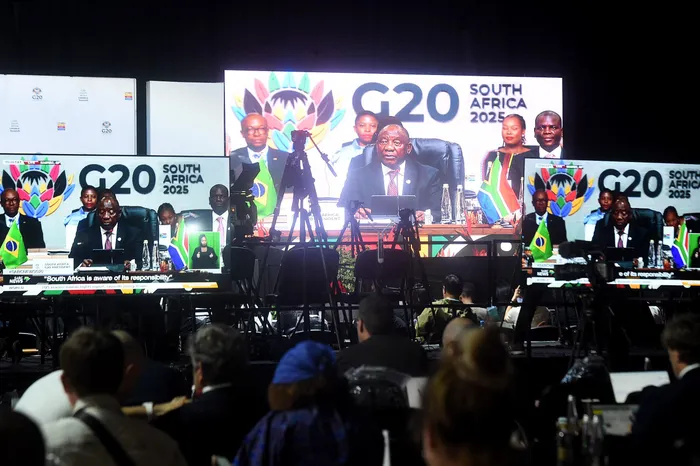G20 legitimacy can't be questioned, maintains hosts South Africa

President Cyril Ramaphosa makes his opening remarks at the G20 Leaders' Summit held at the Nasrec Expo Centre in Johannesburg on Saturday.
Image: Itumeleng English / Independent Newspapers
THE legitimacy of the G20 Summit could not be questioned as the declaration was issued with the support of member countries attending the global event at the weekend, says Minister in the Presidency, Khumbudzo Ntshaveni.
"We have prioritised those things in the declaration that South Africa, other African countries, and our partners in the G20 will continue to implement…we don’t need anybody to take them forward, we can take them forward ourselves.
“But also the United Kingdom will take them forward (when it hosts the G20 in 2027), and we will remain part of the troika of the G20, and we will make sure the South African voice will be there.
“If they (US) don’t want us to participate, they will have to tell the 19 other members of the G20 that South Africa cannot participate, and the world will have to watch what the other members of the (bloc) will do.”
Her remarks come after White House spokesperson Anna Kelly said South African President Cyril Ramaphosa had pushed to issue a G20 leaders' declaration addressing the climate crisis and other global challenges "despite consistent and robust US objections."
She said US President Donald Trump looked forward to "restoring legitimacy to the G20 when the US hosts the summit next year.”
President Ramaphosa said on Sunday as hosts, South Africa sought to place Africa's growth and development at the heart of the G20's agenda.
"Through partnerships across society and by remembering our common humanity, we can create a more secure, a more just and a more prosperous world," Ramaphosa said.
The G20 Summit leaders, through the declaration, have reaffirmed their commitment to support efforts addressing the economic obstacles faced by developing countries, including the unfair debt regime.
This has resulted in a high level of debt, which prevents inclusive growth in many developing economies, limits their ability to invest in infrastructure, disaster resilience, healthcare, education, and other development needs, the leaders declared.
Maxim Oreshkin, the deputy head of the Russian Federation’s presidential administration, said ‘weak (global financial) institutions limit the financial flows of developing countries, and this is not enough to deal with the African debt crisis, which will reach three trillion dollars this year.
International relations expert Dr Noluthando Phungula said the US decision not to send a senior Trump administration official to attend the summit, “inadvertently speaks to a clearer call from the Global South towards multilateralism and a reformation of international power structures”.
Cape Times